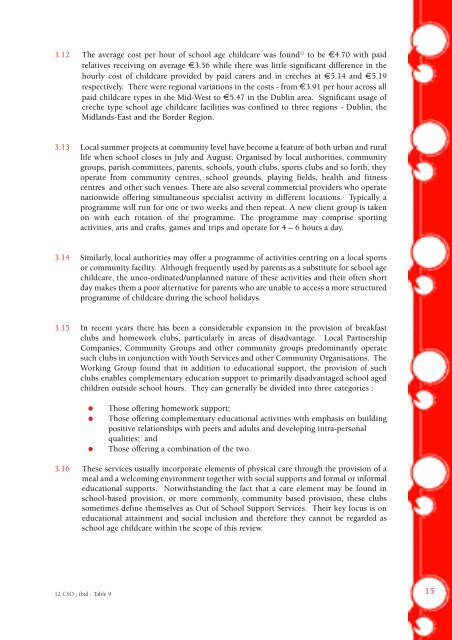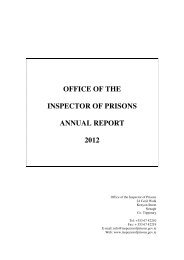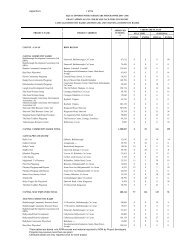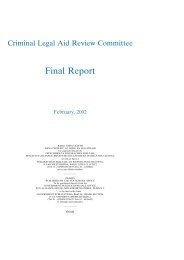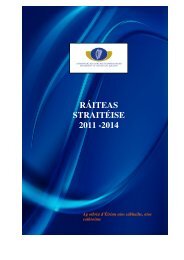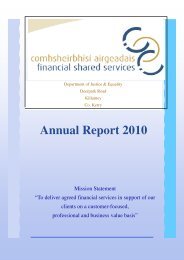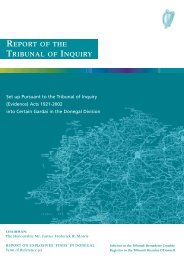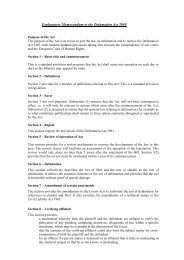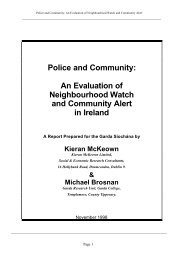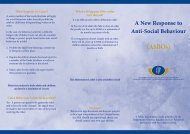Developing School Age Childcare - Department of Children and ...
Developing School Age Childcare - Department of Children and ...
Developing School Age Childcare - Department of Children and ...
You also want an ePaper? Increase the reach of your titles
YUMPU automatically turns print PDFs into web optimized ePapers that Google loves.
3.12 The average cost per hour <strong>of</strong> school age childcare was found 12 to be €4.70 with paidrelatives receiving on average €3.56 while there was little significant difference in thehourly cost <strong>of</strong> childcare provided by paid carers <strong>and</strong> in crèches at €5.14 <strong>and</strong> €5.19respectively. There were regional variations in the costs - from €3.91 per hour across allpaid childcare types in the Mid-West to €5.47 in the Dublin area. Significant usage <strong>of</strong>crèche type school age childcare facilities was confined to three regions - Dublin, theMidl<strong>and</strong>s-East <strong>and</strong> the Border Region.3.13 Local summer projects at community level have become a feature <strong>of</strong> both urban <strong>and</strong> rurallife when school closes in July <strong>and</strong> August. Organised by local authorities, communitygroups, parish committees, parents, schools, youth clubs, sports clubs <strong>and</strong> so forth, theyoperate from community centres, school grounds, playing fields, health <strong>and</strong> fitnesscentres <strong>and</strong> other such venues. There are also several commercial providers who operatenationwide <strong>of</strong>fering simultaneous specialist activity in different locations. Typically aprogramme will run for one or two weeks <strong>and</strong> then repeat. A new client group is takenon with each rotation <strong>of</strong> the programme. The programme may comprise sportingactivities, arts <strong>and</strong> crafts, games <strong>and</strong> trips <strong>and</strong> operate for 4 – 6 hours a day.3.14 Similarly, local authorities may <strong>of</strong>fer a programme <strong>of</strong> activities centring on a local sportsor community facility. Although frequently used by parents as a substitute for school agechildcare, the unco-ordinated/unplanned nature <strong>of</strong> these activities <strong>and</strong> their <strong>of</strong>ten shortday makes them a poor alternative for parents who are unable to access a more structuredprogramme <strong>of</strong> childcare during the school holidays.3.15 In recent years there has been a considerable expansion in the provision <strong>of</strong> breakfastclubs <strong>and</strong> homework clubs, particularly in areas <strong>of</strong> disadvantage. Local PartnershipCompanies, Community Groups <strong>and</strong> other community groups predominantly operatesuch clubs in conjunction with Youth Services <strong>and</strong> other Community Organisations. TheWorking Group found that in addition to educational support, the provision <strong>of</strong> suchclubs enables complementary education support to primarily disadvantaged school agedchildren outside school hours. They can generally be divided into three categories :Those <strong>of</strong>fering homework support;Those <strong>of</strong>fering complementary educational activities with emphasis on buildingpositive relationships with peers <strong>and</strong> adults <strong>and</strong> developing intra-personalqualities; <strong>and</strong>Those <strong>of</strong>fering a combination <strong>of</strong> the two.3.16 These services usually incorporate elements <strong>of</strong> physical care through the provision <strong>of</strong> ameal <strong>and</strong> a welcoming environment together with social supports <strong>and</strong> formal or informaleducational supports. Notwithst<strong>and</strong>ing the fact that a care element may be found inschool-based provision, or more commonly, community based provision, these clubssometimes define themselves as Out <strong>of</strong> <strong>School</strong> Support Services. Their key focus is oneducational attainment <strong>and</strong> social inclusion <strong>and</strong> therefore they cannot be regarded asschool age childcare within the scope <strong>of</strong> this review.12 CSO ; ibid : Table 915


